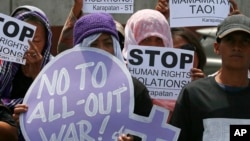The Philippine government and communist rebels have agreed to resume peace talks and restore separate cease-fires after an escalation of deadly clashes, officials said Sunday.
Government and rebel negotiators will resume talks early next month and discuss the terms of a broader cease-fire, presidential adviser Jesus Dureza said. Norway, which has been brokering the negotiations, hosted two days of informal talks in the Netherlands that led to a decision to resume the negotiations on ending one of Asia's longest-running rebellions.
Threat of all-out war
Just three days ago, President Rodrigo Duterte threatened to unleash an all-out war against the New People's Army guerrillas after they killed four policemen and wounded another in an ambush in southern Davao del Sur province.
"I'm ready for all-out war, another 50 years,'' Duterte said Thursday at the policemen's wake. ``I can assure you that the armed forces and the Philippine National Police would respond. This time I'm using everything ... rockets and bombs.''
Duterte did not mention the talks' resumption in his speech at the annual graduation of cadets at the Philippine Military Academy Sunday in northern Baguio city, where he instead condoled with the families of government troops who died in combat. He promised better and more weapons for soldiers and thanked "those who risked their lives and limbs to defend this country's sovereignty as well as those who continue to offer their sweat and blood to fortify the pillars of a great nation that we are presently trying to build."
The military welcomed news of the breakthrough but said it would await formal notice from government negotiators and Duterte's instructions. "Pending this, all military operations will continue and remain at current state," the military said in a statement.
The Maoist guerrillas said they would remain vigilant because of continuing military and police counterinsurgency operations but added they were optimistic with the talks' resumption.
"Instead of putting the lives of millions of people in harm's way, such as Duterte's all-out-war declaration, better yet we try to settle our differences on the negotiating table," said the rebels' Melito Glor command, which has a presence in the mountainous provinces south of Manila.
Nearly 50 years of war
Founded in 1968, the rural-based guerrilla group has unsuccessfully tried to negotiate with five Philippine presidents before Duterte. Battle setbacks, surrenders and infighting have weakened the rebel group, which is considered a terrorist organization by the United States and remains a major Philippine security threat.
The rebels and the government declared separate cease-fires last year as they resumed peace talks. That allowed the government to withdraw troops from battlefields to focus on an offensive against the Abu Sayyaf and other Muslim extremist groups in the country's south.
In a joint statement with the rebels, the Philippines also agreed to release a rebel consultant to the talks and reinstate immunities from arrest for other guerrilla consultants. It pledged to release soon four other consultants and 19 detainees the guerrillas regard as political prisoners.




